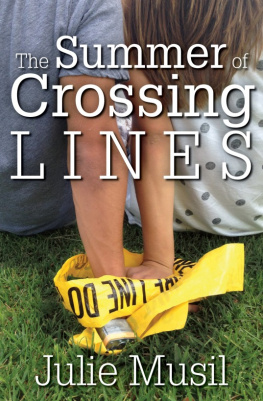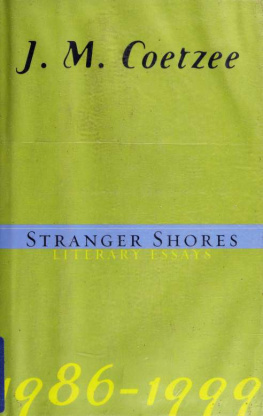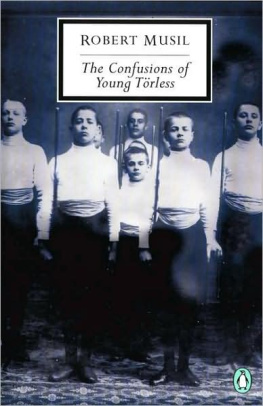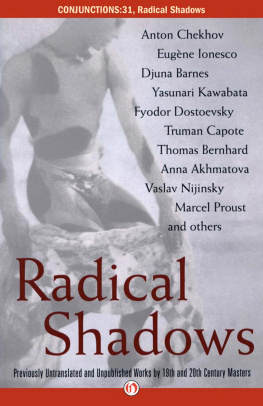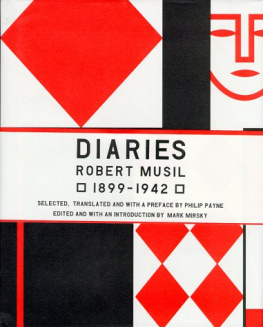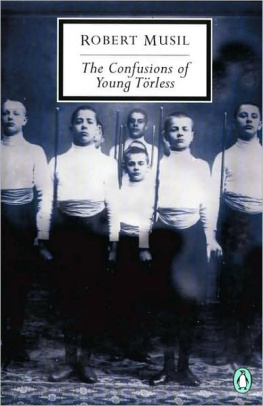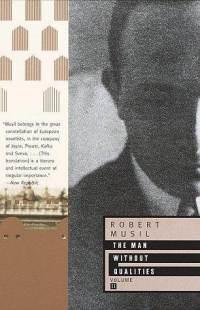Robert Musil [Musil - The Man Without Qualities: Picador Classic
Here you can read online Robert Musil [Musil - The Man Without Qualities: Picador Classic full text of the book (entire story) in english for free. Download pdf and epub, get meaning, cover and reviews about this ebook. year: 2017, publisher: Pan Macmillan, genre: Art. Description of the work, (preface) as well as reviews are available. Best literature library LitArk.com created for fans of good reading and offers a wide selection of genres:
Romance novel
Science fiction
Adventure
Detective
Science
History
Home and family
Prose
Art
Politics
Computer
Non-fiction
Religion
Business
Children
Humor
Choose a favorite category and find really read worthwhile books. Enjoy immersion in the world of imagination, feel the emotions of the characters or learn something new for yourself, make an fascinating discovery.

- Book:The Man Without Qualities: Picador Classic
- Author:
- Publisher:Pan Macmillan
- Genre:
- Year:2017
- Rating:3 / 5
- Favourites:Add to favourites
- Your mark:
- 60
- 1
- 2
- 3
- 4
- 5
The Man Without Qualities: Picador Classic: summary, description and annotation
We offer to read an annotation, description, summary or preface (depends on what the author of the book "The Man Without Qualities: Picador Classic" wrote himself). If you haven't found the necessary information about the book — write in the comments, we will try to find it.
Robert Musil [Musil: author's other books
Who wrote The Man Without Qualities: Picador Classic? Find out the surname, the name of the author of the book and a list of all author's works by series.
The Man Without Qualities: Picador Classic — read online for free the complete book (whole text) full work
Below is the text of the book, divided by pages. System saving the place of the last page read, allows you to conveniently read the book "The Man Without Qualities: Picador Classic" online for free, without having to search again every time where you left off. Put a bookmark, and you can go to the page where you finished reading at any time.
Font size:
Interval:
Bookmark:
R OBERT M USIL
T HE M AN W ITHOUT Q UALITIES
Translated from the German by Sophie Wilkins
Editorial consultant Burton Pike
With an introduction by Jonathan Lethem
PICADOR CLASSIC
The Austrian writer Robert Musil was born in the nineteenth century into an upper-class family. He was educated at a pair of military boarding schools. Trained as a mathematician and engineer, Musil hadbefore serving as an officer in World War Onealready diverted his energies into literature. His first novel, Young Trless, published in 1908, is a slim, morbid, and unforgettable tale of adolescent sadism. After his military discharge Musil wrote stories, plays, and essays with brilliant deliberateness, establishing himself in a Weimar culture from which he held somewhat aloof; he was also a copious diarist. By 1921 he had begun work on a massive novel that would occupy him for the rest of his life, which he would never complete, and which is one of the greatest and most mysterious literary artifacts of both the twentieth century and the history of the novel. Musil was still writing it twenty-one years later, in 1942, when he died in exile in Switzerland during the height of World War Two.
The Man Without Qualities presents itself to the reader from the first as a conundrum, from the provocative negation of the title to a prose characterized by its density and its tone of mercurial irony. The novel is distinguished by its simultaneous massiveness and instability; not only unfinished, it lacks even a clearly proposed structure, length, or conclusion. Though Musil allowed publication in two portions, in 1930 and 1933, he later expressed regret at how this had frozen material he might have wished to rework. Excluded from this edition are further chapters Musil withdrew, along with copious drafts, alternate scenes, and paraphrases of possible directions for the books continuation. For readers in English the problem of translation of Musils complex German prose introduces further instabilities (taking one example, the long central section titled here Unreality Prevails might literally be translated as The What of It Now Happens). Musils novel is the literary equivalent of what the ecological critic Timothy Morton calls a hyperobject, whose precise boundaries in space and time are impossible to measure; the question with a hyperobject is how to place ourselves in relation to it.
Yet The Man Without Qualities is an explosively rewarding journey for its readers, and Musil one of the most unexpected good companions among authors. (I know too few people whove read the book, but among those, a number whove read it twice; it induces obsessions). Behind an initial chilliness, the novel reveals itself as intimate, existentially vertiginous, wildly funny, and dreamlike in the manner of Franz Kafka or Kazuo Ishiguro. At the same time, Musils sociologically discursive portrait of a loosely disguised Vienna in 1913 is disconcertingly prescient. When he writes about unmoored human consciousness, Musil, in his torrential evocations, seems to be conducting an inventory of what it is to be alive and human. When he indulges his preoccupation with the crisis imposed on the individual human soul under modernity, he seems to be writing about 2016, or whatever year you may happen to be reading him. In either sense you find him at your shoulder.
The novel centers on the title character, named only Ulrich, whose biography loosely conforms to Musils: a rakish, privileged and ambivalent bachelor who, having rejected careers in the military and in engineering, begins an inchoate quest for a life worthy of the name, a search defined only by exclusion of everything that isnt pointless, which is to say seemingly everything anyone has ever bothered to do. Yet despite his air of detachment, Ulrich rarely seems smug. Under his incapacity for settling on a sincere attitude beats a desire to locate a next state of beingan ethics not reliant on received legacies, shortcuts, or spare parts.
Crucially, Ulrich isnt a writer. He scorns his musical friend Walter, for what Ulrich sees as a retrograde, art-for-arts-sake, aestheticism. Ulrichs status as searcher-without-avocation slyly divides him from his industrious creator. More crucially, it defines his search outward, in the direction of other human animals. It drives his curiosity about their collective institutions, including the modern city itself, and the modern nation.
Ulrich sees the failure of modernity partly in terms of excesses of specialization. The proliferating jargons of the technocratic classes obstruct any hope of a raw encounter with the mysteries of being. Yet the scientific part of Ulrich knows that the categorical imperative is the stuff of civilization, including the life Ulrich himself enjoys. Our capacities for generating theory, system, and narrative make a kind of dance, the tribal participation characteristic of fin-de-sicle modernity.
Freud, Musils Vienna contemporary, perhaps served as a spur. Psychoanalytic theory, which presumed to rival the novelists domain over intimate experience, would have ratified Musils (already Nietzschean) view that waking human life trembled over an incommensurable ocean of unconscious drives. Freud brought into the social consciousness shocking notions of human behavior; Musil, in turn, seems to delight at including references to nymphomania, menstruation, scopophilia, and exhibitionism. Ulrich and his sister discover their dead fathers hidden stash of pornography while cleaning out his desk; Walters disturbed wife Clarisse, in a long flashback, suffers through ambiguous abuses strongly evocative of Freuds seduction theory. Yet psychoanalysis also comes in for Musils contempt, its self-confirming theses being just the latest set of cultural clothes with which to dress up the naked void Musil believed lay at the heart of human experience.
Despite his cosmic apprehensions, Ulrich becomes enmeshed in the efforts of the aristocratic-bourgeois echelons of Viennarenamed Kakaniato devise an anniversary celebration of the Austro-Hungarian Empire adequate to rival the Prussian celebrations scheduled for the following year. The yearning to locate a sense of higher purpose for a lapsed and mongrel empire for which no such thing is possible is expressed in bureaucratic horseshit: pompous speeches, the filing of endless reports. These efforts are transacted in the upper-class salon hosted by Ulrichs cousin, Frau Tuzzi, or Diotima, a woman whose charisma and pretensions both perplex and arouse Ulrich. This satirical milieunamed The Parallel Campaignhangs under a Sword of Damocles: the horrors of the First World War would soon demolish every pretension and platitude. The Campaign itself becomes a medium in which realpolitik militarism and self-righteous nationalist paranoia advance their nightmare agendas, pushing the country toward war.
But this morbid historical satire is only one of several kinds of fictional plot which interpenetrate the essayistic fugues of Ulrichs solitary, flneur-like existence. Ulrichs triangular involvement with his childhood friend Walter and the troubled, yearning Clarisse could make the whole subject of a more conventional European novel, in the mode of the early Hermann Hesse, or like Henri-Pierre Rochs Jules et Jim. Elsewhere, Ulrichs flirtatious involvement with the half-Jewish daughter of a mixed family, one whose other courtier is a proto-Nazi ethnic nationalist, evokes Maughams Of Human Bondage, mixed with portions of Isherwoods I Am A Camera. Then theres the notorious proletarian sex-murderer, Moosbrugger, subject of fascination for Ulrich and Clarisse and several other characters. This provides the book with a regular does of Gothic relief; the chapters from Moosbruggers point of view are among the most poetic evocations of insanity I know. Ulrichs projections onto Moosbrugger forecast Nazi horrors, but also explore the possibility that the way to a transcendent state may lie in criminality, putting us simultaneously in the territory both Fritz Langs
Next pageFont size:
Interval:
Bookmark:
Similar books «The Man Without Qualities: Picador Classic»
Look at similar books to The Man Without Qualities: Picador Classic. We have selected literature similar in name and meaning in the hope of providing readers with more options to find new, interesting, not yet read works.
Discussion, reviews of the book The Man Without Qualities: Picador Classic and just readers' own opinions. Leave your comments, write what you think about the work, its meaning or the main characters. Specify what exactly you liked and what you didn't like, and why you think so.

